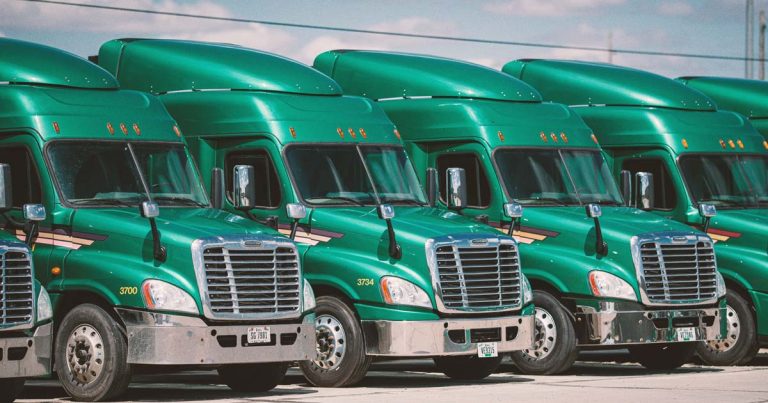Discovering the Path to Becoming a Truck Dispatcher
Becoming a truck dispatcher entails engaging in negotiations, securing load bookings, managing paperwork, and orchestrating the smooth transportation of diverse cargo between brokers and carriers (truck drivers).
Achieving Success as a Truck Dispatcher
To thrive as a truck dispatcher, effective communication, strong organizational prowess, and adept problem-solving skills are crucial.
Unlocking the Benefits of Pursuing a Career as a Truck Dispatcher
As a sought-after profession, aspiring individuals often inquire about the earning potential in this field. According to Comparably, a salary comparison site, the middle 57% of truck dispatchers earn between $42,806 and $107,015 annually. Salary.com reveals a median salary of $51,176, with the top 75% of earners making at least $60,013.
Embracing the Flexibility and Convenience of Working as a Truck Dispatcher
Aside from attractive salaries, the role of a truck dispatcher offers the added advantage of remote work. In a world where remote employment is increasingly prevalent, the ability to work comfortably from home brings undeniable benefits and security.
An In-Depth Guide to Embarking on a Career as a Truck Dispatcher
Delving beyond the salary and fundamental aspects, our comprehensive guide provides valuable insights for individuals interested in pursuing a career as a truck dispatcher. Here’s what you can expect to find:
- Detailed job duties and responsibilities of a truck dispatcher.
- Insight into the earning potential and salary prospects for truck dispatchers.
- Step-by-step instructions on how to become a truck dispatcher.
- Essential skills required to excel in the role of a truck dispatcher.
- Recommendations on where to find reliable training programs to kickstart your truck dispatching career.
Discovering the Role of a Truck Dispatcher in the Logistics Industry
A truck dispatcher serves as a vital intermediary between brokers and truck drivers, overseeing various aspects of the logistics business on behalf of their clients, the carriers (truck drivers).
Unveiling the Daily Responsibilities of a Truck Dispatcher
The day-to-day responsibilities of a truck dispatcher encompass a range of tasks, including:
- Utilizing Load Boards and Networking: Leveraging load boards and personal connections to identify freight that aligns with drivers’ requirements.
- Collaboration with Brokers: Maintaining ongoing communication with brokers to provide driver status updates and estimated time of arrivals (ETAs).
- Coordinating Pick-up and Delivery: Effectively relaying pick-up and delivery details to truck drivers, ensuring smooth operations.
- Route Mapping with Specialized Software: Utilizing specialized software to map out optimal transport routes for efficient cargo transportation.
- Communication with Drivers: Sustaining constant communication with drivers throughout the transit of cargo.
- Scheduling Cargo Activities: Efficiently scheduling cargo pick-up and delivery, adhering to time-sensitive requirements.
- Timeliness Monitoring: Vigilantly monitoring the transportation process to ensure timely delivery of cargo.
- Skillful Negotiations: Conducting negotiations with brokers and other relevant parties to optimize outcomes.
- Documentation and Record-Keeping: Maintaining accurate records of freight orders, resolving billing issues, and documenting transactions. Additionally, reviewing truck drivers’ logs for compliance and accuracy.
- Driver Dispatching: Facilitating the dispatching of drivers to assigned routes and loads.
- Tracking Driver Logbook Hours: Monitoring and managing driver logbook hours to ensure compliance with regulations.
- By performing these key responsibilities, a truck dispatcher plays a pivotal role in facilitating the smooth flow of operations within the logistics industry.

Understanding the Distinction: Truck Dispatching vs. Freight Brokering
To gain a clear understanding of truck dispatching, it’s essential to distinguish it from freight brokering. While these roles may seem similar, they are distinct in nature.
Freight Brokers: Facilitators Between Shippers and Carriers
Freight brokers are legal entities that operate as intermediaries between shippers/manufacturers in need of freight transportation and carriers responsible for moving the freight. Their primary role is to represent both parties without having a personal stake in either.
The Crucial Difference: Truck Dispatchers and Freight Brokers
Truck dispatchers, on the other hand, maintain a direct affiliation with carriers and actively support them. Whether as freelance truck dispatchers or independent workers, they function as employees of the carrier, conducting negotiations on their behalf and handling operational tasks.
Understanding the Role of Truck Dispatchers
Truck dispatchers, including dispatch services for owner-operators, work closely with carriers to ensure smooth logistics operations. They play a vital role in:
- Conducting Negotiations: Truck dispatchers negotiate on behalf of carriers to secure favorable terms and agreements.
- Handling Backlog: They efficiently manage and handle any backlog or pending tasks to keep operations running smoothly.
- Supporting Carriers: Truck dispatchers provide ongoing support and assistance to carriers in various operational aspects.
By grasping the distinction between freight brokers and truck dispatchers, individuals can make informed decisions about which role aligns with their interests and career aspirations.
Understanding the Role of Load Boards for Truck Dispatchers
To delve deeper into the world of truck dispatching, it’s crucial to grasp the concept of load boards.
Load boards, often in the form of digital matching systems or online marketplaces, serve as invaluable platforms. Their primary purpose is to connect shippers and freight brokers with carriers, enabling the former to find suitable carriers for their loads while assisting the latter in securing additional loads to optimize their truck capacity and maximize earnings. Prominent load board platforms in the market include DAT and TruckStop, while certain major brokers also operate their own load boards, such as Uber.
Insights into Annual Earnings for Truck Dispatchers
In the United States, truck dispatchers can expect to earn a median salary of $51,176 per year. The middle 57% of professionals in this field earn between $42,806 and $107,015 annually.
Just like any profession, the annual earnings of truck dispatchers can vary based on several factors, including professional experience, hours worked, and the strength of their professional network. Well-established truck dispatchers with extensive experience may enjoy higher salaries, as certain agencies recognize and reward their expertise.
Furthermore, remaining with the same truck dispatch company for an extended period can lead to increased income. This can occur through promotions or planned salary increments as a result of loyalty and tenure.
Location also plays a role in determining the earnings of truck dispatchers. Cities and states with high traffic volumes often offer more demanding job environments that come with better compensation. Additionally, truck dispatchers working remotely for semi-trucks may opt to reside in states with favorable tax laws, allowing for higher take-home pay.
By understanding these factors, aspiring truck dispatchers can gain insights into potential earnings and make informed decisions about their career path.
The Path to Becoming a Truck Dispatcher: A Step-by-Step Guide
Embarking on a successful career as a truck dispatcher is within reach, and you can start from the comfort of your own home. Whether you have the necessary educational background or not, following these five steps will help you establish yourself as a confident truck dispatcher.
1. Obtain the Essential Education and Truck Dispatch Training
Having a high school diploma or GED is highly recommended for aspiring truck dispatchers. Additionally, online truck dispatching courses can provide you with the necessary knowledge and skills to excel in the field. One highly acclaimed course is offered by TruckDispatcherTraining.com, featuring a comprehensive 4-week online program. Through this course, you can learn the fundamentals of truck dispatching, how to start your own dispatch company, and techniques for finding carriers to dispatch.
2. Consider Additional Education
While not a requirement, pursuing an associate degree in a related field can give you a competitive edge as a truck dispatcher. These degrees can be completed in just two years at community colleges and technical schools, offering flexible schedules for those with other commitments. An associate degree can also serve as a steppingstone toward obtaining a bachelor’s degree, depending on your level of interest.
3. Gain Experience as a Truck Dispatcher
To build a strong career as a truck dispatcher, it is crucial to acquire relevant industry experience. This can be achieved by working in roles related to trucking, freight hauling, shipping, or other relevant areas. Consider reaching out to truck dispatch companies and requesting opportunities to shadow experienced dispatchers. Alternatively, enrolling in the Truck Dispatcher Training Course can provide you with step-by-step training on making live calls using load boards. Familiarize yourself with the rules and regulations governing the industry to effectively manage scheduling and freight issues.
4. Develop Your Skill Set
Attention to detail and effective communication are essential skills for a truck dispatcher. Establish methods for organizing records, documenting communications (phone calls, emails, text messages, etc.), and managing schedules. Continuously review your communication processes to identify areas for improvement. Enhancing your telecommunication and written skills will increase your value as a truck dispatcher, opening doors to more job opportunities and a higher salary. Additionally, familiarize yourself with dispatching and telecommunication equipment commonly used in the industry.
5. Prepare for Job Applications
To ensure you are ready and competitive, seek out informational interviews with industry professionals. These interviews provide insights into the work environment, schedules, and the technology used in the field. Building a warm connection through informational interviews can increase your chances of being the first candidate considered when a job opening arises. Additionally, it helps identify the skills you need to develop to become the best possible candidate.

What It’s Like to Work as a Truck Dispatcher
Working as a truck dispatcher offers the flexibility to operate from different locations, including central offices or remote setups like home offices. Truck dispatchers are constantly engaged in managing multiple trucks and facilitating connections between clients and drivers, resulting in a consistently busy workday.
Effective communication between dispatchers and drivers, along with timely updates on shipping schedules, is a primary focus of their work. Additionally, a significant portion of a dispatcher’s time is dedicated to negotiating transportation rates with suppliers and vendors, ensuring cost-effective solutions for deliveries.
Truck dispatchers also rely on mapping and routing software to optimize routes, aiming to find the fastest and most efficient options for their drivers. This involves utilizing advanced tools to maximize productivity and minimize costs.
Given the demanding nature of the role, truck dispatchers can expect to spend a significant amount of time seated or standing at a desk, utilizing computers and phones as essential tools in their daily operations.
Essential Skills for a Successful Truck Dispatcher
To thrive as a truck dispatcher, it is crucial to cultivate a diverse set of skills encompassing both soft and hard skills. These proficiencies encompass various areas such as interpersonal communication, technical aptitude, attention to detail, and problem-solving abilities, among others. Here, we will delve into key skills that play a vital role in the daily operations of a truck dispatcher and provide insights on how to enhance them over time.
1. Effective Interpersonal Skills
The realm of interpersonal skills extends beyond mere communication; it involves honing the ability to empathize, collaborate, and excel within a team dynamic. Since a significant portion of a truck dispatcher’s day involves negotiations with suppliers and constant communication with truck drivers, maintaining a positive and constructive approach is paramount. Enhancing people skills can be achieved through active listening, embracing cultural diversity, and expressing gratitude and acknowledgment.
2. Technical Proficiency
When not engaged in negotiations or providing updates, truck dispatchers rely heavily on computers and mobile devices to carry out their responsibilities. This includes utilizing mapping and scheduling software and applications to optimize routes and minimize costs for drivers. Mastering the usage of relevant applications for organization, cost management, and record-keeping of pickups, deliveries, and cargo in transit is essential for efficient job performance.
Improving technical and computer skills as a truck dispatcher can be accomplished by exploring online courses tailored to specific software or applications, seeking guidance from experienced professionals in the field, and studying relevant literature on best practices.
3. Organizational Excellence and Attention to Detail
Given the vast amount of information truck dispatchers handle on a daily basis, meticulous attention to detail is critical for success. Apart from efficiently processing information from multiple sources and projects while staying organized, effective prioritization of tasks is crucial. For instance, a supplier may demand updates on price negotiations, while a truck driver in the midst of a delivery requires real-time information on route optimization to save time.
Regular self-evaluation and process review contribute to improvement in organizational and detail-oriented skills. Dedicate extra time at the end of each day to analyze what went well, identify areas for improvement, and strengthen the ability to prioritize and make sound decisions in real-time.
4. Proficient Problem-Solving Abilities
Managing multiple projects with varying deadlines is an integral part of a truck dispatcher’s role. Therefore, the capacity to analyze, evaluate, and resolve issues related to freight shipping and receiving is vital. This includes coordinating the schedules of numerous drivers, tracking cargo in transit, rerouting drivers and their shipments in response to accidents, inclement weather, or urgent situations, and securing last-minute space for shipments. Mastery of these problem-solving abilities not only streamlines the daily workflow of a truck dispatcher for semi-trucks but also enhances job satisfaction.
Improving problem-solving skills requires consistent effort, but the results can be remarkable. Adopting techniques such as focusing on solutions to remain open-minded and clearly defining the problem to pinpoint its root cause can contribute to continuous growth in this area.
Choosing Between Self-Employment as a Truck Dispatcher and Working for a Truck Dispatch Company
In addition to the various aspects involved in becoming a truck dispatcher, such as effectively using load boards, conducting contract negotiations, and collaborating with carriers, it is essential for truck dispatchers to determine the ideal employment structure for their career.
The truck dispatcher profession offers two primary employment options: working as an employee for a truck dispatch company or pursuing self-employment as an independent contractor. Let’s explore the key distinctions between these choices:
Working for a Truck Dispatch Company:
- Stability and Support: Joining a reputable truck dispatch company provides the advantage of stability and a supportive work environment. You can rely on a consistent income, access to valuable company resources, and guidance from experienced professionals.
- Established Network: Truck dispatch companies often possess an extensive network of clients, carriers, and industry contacts. This pre-existing network can save you time and effort in establishing your own connections from scratch.
- Learning Opportunities: By working within a truck dispatch company, you gain the opportunity to learn from seasoned truck dispatchers and benefit from their industry insights. The company’s experienced professionals can provide valuable mentorship and training programs.
- Limited Autonomy: As an employee, you may have less autonomy over your work schedule and decision-making processes. Adhering to the company’s policies and procedures can impact your independence to some extent.
Self-Employment as an Independent Truck Dispatcher:
- Flexibility and Freedom: Opting for self-employment as a truck dispatcher offers greater flexibility in terms of setting your own work hours, selecting clients and carriers, and devising personalized business strategies. You have the freedom to shape your career according to your preferences.
- Potential for Higher Earnings: As an independent truck dispatcher, you have the opportunity to negotiate your rates directly with clients and carriers. This potential for higher earnings becomes more promising as you establish a strong reputation and expand your client base.
- Business Ownership: Working for yourself grants full ownership and control over your truck dispatch business. You can build your own brand, develop customized strategies, and explore opportunities for business growth.
- Entrepreneurial Responsibilities: Self-employment requires assuming additional responsibilities related to business management, marketing, and financial planning. As an independent truck dispatcher, you must handle these entrepreneurial tasks to ensure the success of your business.
How to Become a Successful Independent Truck Dispatcher
Becoming an independent truck dispatcher involves a combination of mastering the necessary skills, managing your own business, and effectively marketing your services. While the initial requirements may be slightly higher compared to becoming an employee, the benefits of independence, schedule control, and financial compensation make it a worthwhile pursuit. Whether you have prior experience in truck dispatching and are ready to establish your own venture or are starting fresh as an independent truck dispatcher for semi-trucks, the following steps will guide you on the path to becoming a successful owner-operator truck dispatcher.

1. Establish Your Business
To formalize your truck dispatcher business, it’s crucial to register your company and give it an official name. Opt for a concise and memorable name that clearly communicates your specialization, such as “Independent Dispatch” or “Dispatching Services.” This name will play a significant role in building your online presence. Additionally, apply for an Employer Identification Number (EIN) from the IRS and determine the appropriate structure for your business. While there are various options like sole proprietorship, limited liability companies (LLC), corporations, and partnerships, an LLC structure may be well-suited for the initial stages. Prepare essential contracts, including service agreements and dispatcher-carrier agreements, to ensure smooth operations and liability coverage.
2. Build Your Website
As an independent truck dispatcher, effective marketing is crucial. Create a professional website that reflects your business name and preferably has a .com domain. Consider establishing a presence on other social media platforms like Facebook, Instagram, TikTok, and YouTube to showcase your expertise, connect with potential clients, and facilitate social media advertising. However, ensure that all roads lead back to your website, where you can provide comprehensive information about your services, rates, and essential contact details.
3. Subscribe to Reliable Load Boards
A fundamental aspect of truck dispatching is finding high-quality loads for your carriers and partners. While you may establish connections through your marketing efforts, subscribing to industry-leading load boards is the industry standard. Invest in subscriptions to renowned load board platforms such as DAT Load Boards, 123LoadBoard, Direct Freight, TruckStop.com, or Trucker Path. These platforms provide access to thousands of new load postings daily, ensuring you have ample opportunities to choose from.
4. Cultivate Relationships
While truck dispatching revolves around logistics and shipping, building and nurturing relationships is key to long-term success. As a truck dispatcher, you regularly interact with carriers, shippers, and brokers. Explore different avenues to establish connections:
- Directories: Utilize online directories like DAT Directory to access contact information for potential partners.
- Advertising: Leverage paid advertisements on platforms such as Facebook, YouTube, Instagram, and Google to target specific companies or individuals and showcase your new business.
- Existing Communities: Engage with industry-specific Facebook Groups or LinkedIn communities to offer your independent truck dispatcher services. Seek permission from group administrators to share information about your company and consider offering a discounted rate to attract potential clients.
- Your Audience: If you actively participate in social media or regularly share informative content, seize the opportunity to mention your services consistently and generate leads.
Getting Started as an Independent Truck Dispatcher: Booking Loads
Now that your business is set up and you’ve established connections with carriers, it’s time to secure loads for them. There are several effective methods to accomplish this.
One approach is to post and share information about the trucks you’re working with on load boards. This allows the board to find suitable matches for your available trucks. Another option is to conduct a manual search on the load board, where you enter specific details about the truck, including any special features, origin, and destination.
As you expand your network and collaborate with more carriers, it’s important to leverage time-saving features. Saving your frequently used searches will enable you to input information more efficiently. Additionally, setting up alerts will notify you whenever a new load that meets your criteria is posted. This will save you valuable time by eliminating the need to constantly sift through updated pages.
Once you receive a notification or find a desired search result, it’s time to initiate negotiations. Get in touch with the broker, gather all the necessary details, and enjoy the process of building a successful independent truck dispatcher business.


















